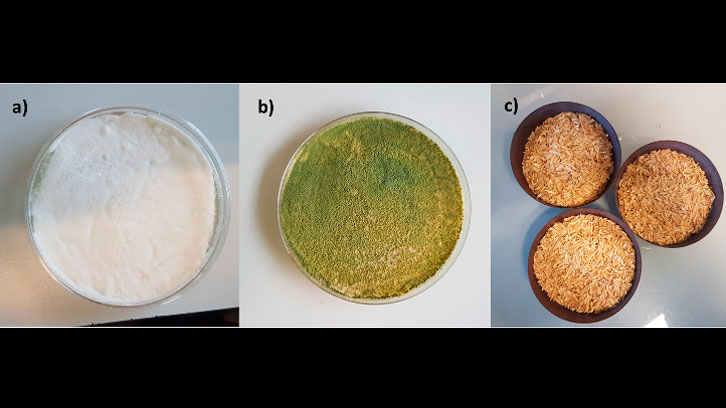Rice husk as a source for fungal biopesticide production by solid-state fermentation using B. bassiana and T. harzianum

The set of environmental and health problems associated to chemical pesticides lead to the development of alternatives to treat crops. One of the options are the biopesticides derived from bacteria and fungi. Within this framework, the challenge of the composting research group, GICOM, of the UAB, is to produce fungi derived biopesticides, thanks to the Solid-State Fermentation (SSF) process. The goal is to use agroindustrial wastes as substrates for the production of a fungal biopesticide which has to be as effective as the mainly used and no longer an element of risk.
Insect pests represent a major menace to crops all over the world. As a solution, chemical pesticides have been widely used and spread over agricultural fields and crops for many years. However, public awareness on these products raised due to numerous problems both for human health, as they pose a serious threat due to their toxic and mutagenic properties, and for their environmental risks, as chemical pesticides have also affected the environment by contaminating soil, air, and water, and impacting the health of non-targeted plants and animals due to their toxicological effects. Also, chemical pesticides effectiveness varies due to resistance developed by target pests, continuously rising the need to develop new products. Public concern on chemical pesticides’ use and growing legal restrictions to existing and new products reveal the need for alternative solutions. Among them, biological control agents (BCA) have taken the spot as they do not present any harm to humans, crops or ecosystems while being highly pathogenic to most insect pests.
BCAs involve the use of biological insecticides generally obtained by microbial fermentation. A biopesticide has been defined as ‘‘a mass-produced agent manufactured from a living microorganism or a natural product and sold for the control of plant pests”. The worldwide most used biocontrol agent is Bacillus thuringiensis, a gram-positive bacteria with the capacity to produce a toxin, which is completely harmless to humans, plants and other animals, but has great potential to be fatal to a wide range of insect pests. Aside from Bacillus thuringiensis, fungal BCAs also present a highly promising alternative to traditional chemical pesticides. Among the wide variety of fungal species, the genus Beauveria and Trichoderma have gained notable interest due to their great BCA potential among other entomopathogenic fungi.
Fungal biopesticides have been produced using several types of reactors, both with submerged fermentation and solid-state fermentation (SSF). Each system presents several advantages and drawbacks. However, solid-state fermentation, which has been defined as a process that occurs in the absence or near absence of free water, generally using natural substrates as carbon and energy source, represents a relatively low-cost process used to obtain aerial conidia. Low costs are associated to the use of agroindustrial wastes as substrates. In fact, an extensive list of wastes has been reported including wheat and rice bran, wheat and rice straw, refused potatoes and sugarcane bagasse among others,.
The aim of the work developed was to present a robust SSF process at laboratory level to produce a fungal biopesticide using both genera Beauveria and Trichoderma and rice husk as substrate in packed bed reactors. Process relevant parameters (temperature, initial moisture, C/N ratio, aeration rate and inoculum concentration) have been optimized to maximize spore production (the pesticide effect related to spore concentration). This information is crucial for further scale up of the biopesticide production process, the long-term objective of the present investigations.
Robustness of the process was demonstrated by means of statistical analysis of the data after 33 tests performed for each fungus. Future work will develop operational strategies at bench-scale for further reliable scale-up to pilot plant.
Composting Research Group, GICOM.
Department of Chemical, Biological and Environmental Engineering, Engineering School.
Universitat Autònoma de Barcelona (UAB).
References
Arnau Sala, Adriana Artola, Antoni Sánchez, Raquel Barrena. Rice husk as a source for fungal biopesticide production by solid-state fermentation using B. bassiana and T. harzianum. Bioresource Technology, vol. 296, 2020, https://doi.org/10.1016/j.biortech.2019.122322.


